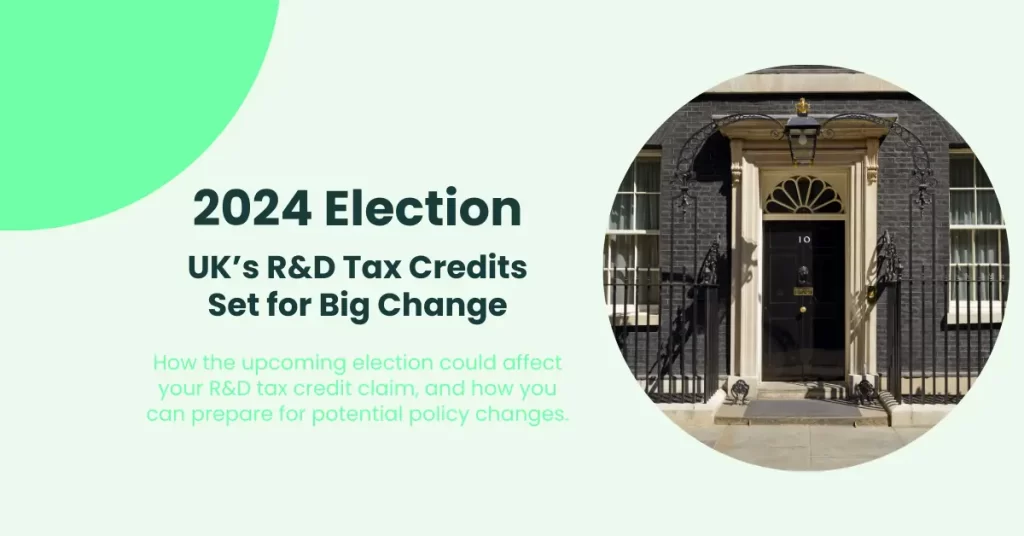2024 Election: UK’s R&D Tax Credits Set for Big Change

Discover how the 2024 UK General Election could reshape R&D Tax Credits and impact business innovation. Learn about potential policy changes and strategic planning for businesses.
Impact of the 2024 UK General Election on R&D Tax Credits and Business Innovation
The upcoming British election has the potential to significantly impact R&D allowances, as leading political parties have different approaches to the incentive. For instance, while the Conservative party would likely maintain the current system, a Labour victory could lead to reforms that may see the increase in public investment. Essentially this vote has the potential to change the face of the technology and research sectors in the UK.
Introduction
Throughout this post we’ll explore the past and present approaches to R&D allowances in order to highlight the possible ways that the upcoming election could impact your claim – allowing you to plan ahead for any political scenario!
Overview of the 2024 UK General Election
After 14 years with majority power, The Conservative Party are facing the biggest election of their tenure. As they battle to extend their parliamentary legacy, the Tories have been unusually quiet about their approach to business in the UK – perhaps hoping that current policy speaks for itself.
Meanwhile The Conservatives’ primary competitor, Labour, are appealing to businesses through sheer boldness, with Shadow Chancellor Rachel Reeves stating she wants to lead the most “pro-business treasury our country has ever seen”.
All this considered, the 2024 UK election is likely to be instrumental in business development.
Importance of R&D Tax Credits for UK Businesses
R&D tax credits are a cornerstone of innovative progress throughout the UK, thanks to their ability to minimise the financial risk often associated with research and development. This crucial support fosters an environment that drives economic growth while attracting global corporations to the UK.
Significance of R&D Tax Credits
Definition and Purpose of R&D Tax Credits
Simply put, R&D tax credits are government funded incentives that allow your business to offset a percentage of your research and development expenditures. The incentive allows you to invest in the advancement of your industry without taking a heavy financial risk.
Eligibility Criteria for R&D Tax Credits
In order to qualify for R&D tax credit, your business must be involved in research and development activities that seek to further develop your industry. Additionally, these advancements should be using science and technology in order to produce or improve products, systems or software.
Types of R&D Tax Credits: SME R&D Tax Credits and RDEC
Prior to April 2024 there were two primary R&D tax credit schemes:
- Small and Medium Sized Enterprise (SME) R&D Relief
- Research and Development Expenditure Credit (RDEC)
While the SME R&D relief offered higher relief rates to smaller businesses, the RDEC scheme allowed companies to claim R&D tax credits even if their project is operating at a loss.
Current Landscape of R&D Tax Credits in the UK
Overview of Existing R&D Tax Credit Schemes
On April 1st 2024, SME R&D relief and RDEC merged to form a singular tax credit scheme that’s aimed to further incentivise businesses to invest in their innovation. This means that any business whose accounting year begins on or after April 1st 2024 must take this into consideration when making an R&D claim.
Impact on Businesses Before the 2024 Election
A national statistics publication by HMRC estimated that between 2021 and 2022, over 90,000 businesses made an R&D claim, with the total amount of qualifying expenditure being £44.1billion.
Compared with the estimated 45,000 claims made between 2015 to 2016, it’s very clear that the impact on businesses throughout the UK has been formative, with more and more businesses choosing to expand their capabilities with research and development.
Key Benefits for SMEs and Large Enterprises
Investing in research and development presents a variety of advantages for large and small companies alike. SMEs for instance would benefit from enhanced cash flow and reduced financial risk – not to mention it gives them a competitive edge! Meanwhile large companies would experience increased investment, financial efficiency and they’d become competitors on the global stage.
Potential Changes in R&D Tax Credits Post-2024 Election
Conservative Party’s Stance on R&D Tax Credits
After merging SME R&D Tax Relief with RDEC back in April, The Conservative Party ensured that going forward, R&D claims will cease to be made according to company size. The measure was introduced to establish an above the line credit that incorporates the generosity of the SME scheme. This new merged scheme also includes restrictions on overseas expenditure.
With these actions The Conservatives prove they’re dedicated to enhancing UK based innovative research. By allowing greater access to funding, they’re working to ensure that businesses continue to be incentivised to undergo research and development projects.
Labour Party’s Approach to Innovation and Tax Credits
In Labour’s industrial strategy the party alluded to their dedication to innovation. They announced this with a range of tax benefits that are designed to elevate UK based businesses.
While there is nothing in this strategy about R&D tax credits, The Labour Party made a statement in February 2024 informing the British public that they will maintain and stabilise R&D credits by introducing a new Regulatory Innovation Office. This is aimed to improve accountability of claimants.
Possible Scenarios and Outcomes
Of course should The Conservative Party win the majority, R&D isn’t likely to change all that much. What you are likely to experience when making a claim, is that you will require more documentation than previous years, but your claim is likely to be more financially advantageous.
Should The Labour Party win the election, there’ll likely be a shift in how to claim R&D tax credits. With the introduction of a Regulatory Innovation Office, it’s likely you’ll be expected to provide even more documentation that backs your claim.
Political Influence on UK Business Funding
How Election Results Could Affect Business Funding
The upcoming election has the power to reshape business funding as we know it. While a Conservative win may sustain or enhance current R&D schemes, a Labour victory is likely to increase public R&D funding while altering tax credits to certify fairness between SME and Large company funding.
Role of Smaller Political Parties in Shaping Policies
While Conservatives and Labour are likely to lead the vote, we cannot overlook the smaller parties that may influence this election. Here are some of their stances on business funding and R&D:
- Liberal Democrats state there should be purpose driven partnership between business and government, and aim to increase investment by forming a British Business Bank
- The Green Party make climate action their priority, and are more likely to direct funding to support innovative green technology
- Reform states that investment should be targeted at specific barriers to innovation and growth, meaning that R&D projects with unsuccessful results may not be entitled to allowances under Reform
Potential Shifts in R&D Funding and Incentives
Although Labour and Conservatives have a tendency to end up in the majority, it doesn’t mean that smaller parties will be quieted. We may just see Liberal Democrats lobbying for greater allowances, or The Green Party advocating for a separate green initiative R&D fund.
Strategic Business Planning for R&D Funding Changes
Importance of Proactive Planning
A change in party rule could mean a change in how making a claim works, meaning planning for a variety of outcomes could be imperative to your future R&D claims – especially if your accounting year is set to begin after July 5th.
Scenario Analysis and Risk Management
There are a range of things that can help you to plan ahead for potential electoral outcomes. Here are a few of the most helpful:
- Keep an on media and public responses to parties
- Monitor economic indicators to gauge business confidence
- Evaluate policies and manifestos
Focus on that final one is what will help you most, as it’ll act as a guide on what you should prepare for ahead of time should any party come into political power.
Aligning Business Strategies with Government Priorities
No matter the outcome, there are certain things that you can do to help protect your R&D claims ahead of time. Keeping well documented financial records, maintaining research and development activity documents (including a technical report) and even deciding on your reporting officer are key points to align with anticipated policies.
Seeking Professional Advice for R&D Tax Credits
Benefits of Engaging with Tax Specialists
One of the greatest benefits to consulting with an R&D tax credit specialist is that you’re always going to get the latest updates in policy and in changes that could affect your claim.
How to Choose the Right R&D Consultant
In order to assess which R&D tax credit specialist is right for you, it’s important to assess the consultant’s expertise in your industry. You can do this by checking the validity of their references and testimonials. Furthermore, evaluating their understanding of policy and regulatory changes will help you to establish their expertise.
Additionally, it is important to ensure that they’re transparent throughout communication, and that there is a fee structure that protects you from potential hidden costs.
Ensuring Compliance and Maximising Benefits
When it comes to maximising the benefits of R&D tax credits, compliance is crucial. By strictly adhering to the latest policies, your claim is placed in an optimal position that allows you to confidently claim the full extent of your qualifying expenditure.
To ensure eligibility, accurate documentation and financial records are required – this means frequently updating any relevant documentation to reflect the current status of your research and development project.
Long-Term Implications for UK Business Innovation
Forecasting the Future of R&D in the UK
Some of the greatest long term trends in R&D and innovation are likely to shed a spotlight on green technologies, digital transformation and advancements in healthcare. Government backed climate change initiatives should see an increase in funding for research and development engaging in sustainable technology. Similarly in a bid to strengthen the NHS, healthcare innovation will become pivotal with focuses likely being on personalised medicine.
Within the digital sector, there will surely be an emphasis on enhancing AI capabilities and cybersecurity.
Adapting to an Evolving Innovation Landscape
In order to adapt to changes throughout the innovation landscape, it’s imperative that you continue to update not only your technologies, but also your methodology. By diversifying your research and development activities, you should easily be able to keep on top of regulatory changes.
Leveraging R&D Tax Credits for Sustainable Growth
By investing in innovative research and development, you’re placed in a position to leverage R&D tax credits that inspire sustainable growth. The following are a few examples of how this is possible:
- Enables you to reinvest in innovative research and development
- Allows you to allocate tax credit savings to hire skilled workers
- Permits you invest in greater technological infrastructure
Recap of Key Points
In summary, the impact of the 2024 general election could be instrumental on how R&D tax credits work and your ability to claim them. From the continued practice of the RDEC and SME Tax Relief merger to the introduction of a specialised review office, there could soon be a whole new way to present an R&D claim to HMRC.
Final Thoughts on Preparing for Post-Election Changes
Thankfully there is one thing that you can guarantee will be a necessity no matter the outcome of the election – your documentation will have to be more detailed.
In order to ensure that you are prepared for any post-election changes, it’s more important than ever to document every stage of your R&D activities.
This could be the difference between a successful claim and a rejected claim.
Encouragement to Stay Informed and Proactive
In addition to that, remember that it is vital to keep up to date with the latest policy updates, as this will allow you to preempt the details that will be required in your upcoming R&D tax credit claims. To save you spending hours researching, you can keep an eye on our social media for the latest HMRC information and updates.
Invitation to Consult with an Expert
The election may be over a month away, but your company could be eligible for an R&D tax credit claim today. Get in touch with one of our experts to find out if your research and development project is eligible.







